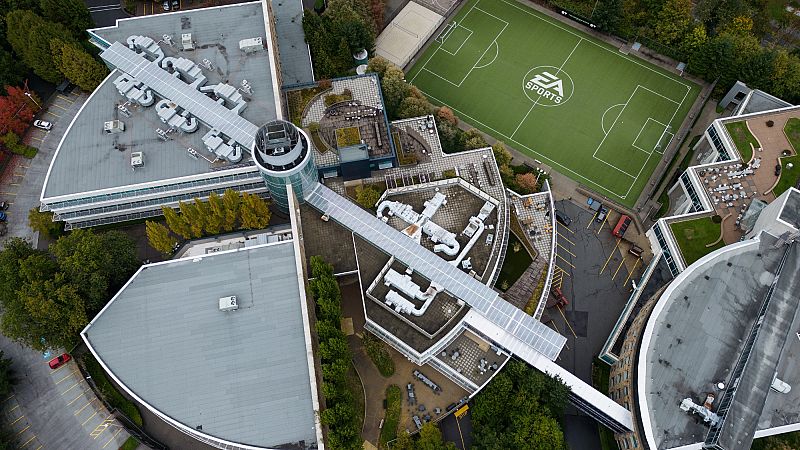 Electronic Arts (EA), the video game behemoth behind such iconic franchises as Madden NFL, Battlefield, and The Sims, is potentially on the verge of being acquired in a staggering $55 billion deal. This would be the largest leveraged buyout ever funded by private equity. This proposed acquisition could reshape the gaming landscape.
Electronic Arts (EA), the video game behemoth behind such iconic franchises as Madden NFL, Battlefield, and The Sims, is potentially on the verge of being acquired in a staggering $55 billion deal. This would be the largest leveraged buyout ever funded by private equity. This proposed acquisition could reshape the gaming landscape.
The Allure of Electronic Arts
In recent years, the video game industry's exponential growth has attracted substantial investment from major players. EA, based in Redwood City, California, is a particularly attractive target due to its well-established brand and diverse catalog of popular titles.
The competitive landscape is intensifying. Microsoft acquired Activision Blizzard for nearly $69 billion in 2023. Mobile gaming companies like Epic Games are also providing more competition.
The consortium of PIF, Silver Lake, and Affinity Partners' combined offer dwarfs the previous record for leveraged buyouts: the $32 billion acquisition of Texas utility TXU in 2007. Leveraged buyouts are financed primarily through borrowed funds, which the acquired company must then repay.
Potential Benefits of Going Private
Becoming a private entity could provide EA with greater autonomy in its game development and distribution strategies.
-
Freed from the pressures of shareholder demands and public market scrutiny, EA could restructure its operations and take a longer-term view. This freedom could allow EA to innovate and experiment without the constant need to meet quarterly earnings targets. As one industry expert put it, this could give EA "a little bit more breathing room to do what they do."
-
This could translate to "more or better games," according to Ben Schneider, a professor at Worcester Polytechnic Institute. However, he cautioned that gamers are often wary of corporate influence on game development.
EA has recently faced criticism for its increasing focus on live-service gaming and aggressive monetization tactics, such as microtransactions. Privatization might allow EA to reduce its reliance on these strategies. The hope is that additional capital from privatization might allow EA "to take this foot off the gas from aggressive microtransaction strategies." However, the potential buyers have not indicated any intention to change these models.
Key Players in the Proposed Acquisition
The acquisition is spearheaded by a consortium including:
-
Saudi Arabia's Public Investment Fund (PIF): PIF has been actively investing in the gaming sector.
-
Silver Lake Partners: A global technology investment firm.
-
Affinity Partners: Founded by Jared Kushner, former advisor to President Trump.
The deal, which is expected to close by the first quarter of 2027, hinges on shareholder and regulatory approvals.
Concerns and Uncertainties
Despite the potential benefits, some analysts remain skeptical about the timing of the buyout. TD Cowen analysts questioned why EA would agree to be acquired before the launch of "Battlefield 6," which is expected to generate significant revenue. They suggested that the positive reception to "Battlefield 6" during its testing phase could further increase EA's share price.
Others argue that the proposed acquisition price of $210 per share undervalues EA's assets and future potential.
Potential for Layoffs
Historically, companies acquired through leveraged buyouts often implement cost-cutting measures. EA has already undergone several rounds of layoffs, including a 5% reduction in its workforce in 2024 and additional layoffs in May. The significant debt financing involved in the deal raises concerns about further job cuts.
The changes in ownership are a very far distance from the people and studios who actually make games. Any direct impact will come in the form of what budgets are given to those studios and, downstream, which projects get cancelled or greenlit.” EA has also closed several game studios in recent years, including the cancellation of a "Black Panther" video game as part of the closure of Cliffhanger Games.
Saudi Arabia's Growing Interest in Gaming
Saudi Arabia's PIF already holds a 9.9% stake in EA and is a minority investor in Nintendo. This investment aligns with the country's demographics and its focus on technology and entertainment. Gaming is particularly popular among younger audiences, who make up a significant portion of Saudi Arabia's population. Gaming can also be “easily transported into a new location,”
PIF's investments also extend to esports, with holdings in competitive gaming platforms like ESL FACEIT. EA's portfolio of sports and esports properties, such as Madden Football and EA Sports FC, aligns with Saudi Arabia's broader expansion into these areas.
However, Saudi Arabia's investments in sports and esports have drawn criticism from human rights organizations, who accuse the nation of "sportswashing" to divert attention from human rights issues. This proposed deal is likely to face similar criticism.
Regulatory Hurdles
The acquisition is subject to regulatory scrutiny, particularly from consumer watchdogs outside the United States. However, some analysts believe that the connections to both the Saudi government and the Trump administration may help EA navigate any regulatory challenges.


No comments:
Post a Comment